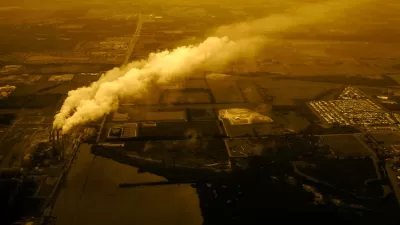A federal evaluation of fuel-efficiency standards says that while drastic climate change is imminent, there is little reason to do anything about it.

In August, an environmental impact statement from the National Highway Traffic Safety Administration noted that the planet would experience a seven-degree temperature increase by the end of the century. However, it did not describe the consequences of this level of climate change:
A rise of seven degrees Fahrenheit, or about four degrees Celsius, compared with preindustrial levels would be catastrophic, according to scientists. Many coral reefs would dissolve in increasingly acidic oceans. Parts of Manhattan and Miami would be underwater without costly coastal defenses. Extreme heat waves would routinely smother large parts of the globe.
Instead, the statement argued that a massive and infeasible shift away from fossil fuels would need to occur to avoid this temperature increase. The Trump administration says that its proposed freeze on fuel-efficiency standards will not have a substantial effect on global warming.
Critics have pointed out the problems with suggesting that fuel standards be rolled back because their impact would be minimal:
Using the no-action scenario "is a textbook example of how to lie with statistics," said MIT Sloan School of Management professor John Sterman. "First, the administration proposes vehicle efficiency policies that would do almost nothing [to fight climate change]. Then [the administration] makes their impact seem even smaller by comparing their proposals to what would happen if the entire world does nothing."
Environmental advocacy groups, scientists, and public officials in the United States and from around the world continue to push for policies and actions they say will address climate change.
FULL STORY: Trump administration sees a 7-degree rise in global temperatures by 2100

Alabama: Trump Terminates Settlements for Black Communities Harmed By Raw Sewage
Trump deemed the landmark civil rights agreement “illegal DEI and environmental justice policy.”

Planetizen Federal Action Tracker
A weekly monitor of how Trump’s orders and actions are impacting planners and planning in America.

Why Should We Subsidize Public Transportation?
Many public transit agencies face financial stress due to rising costs, declining fare revenue, and declining subsidies. Transit advocates must provide a strong business case for increasing public transit funding.

Understanding Road Diets
An explainer from Momentum highlights the advantages of reducing vehicle lanes in favor of more bike, transit, and pedestrian infrastructure.

New California Law Regulates Warehouse Pollution
A new law tightens building and emissions regulations for large distribution warehouses to mitigate air pollution and traffic in surrounding communities.

Phoenix Announces Opening Date for Light Rail Extension
The South Central extension will connect South Phoenix to downtown and other major hubs starting on June 7.
Urban Design for Planners 1: Software Tools
This six-course series explores essential urban design concepts using open source software and equips planners with the tools they need to participate fully in the urban design process.
Planning for Universal Design
Learn the tools for implementing Universal Design in planning regulations.
Caltrans
Smith Gee Studio
Institute for Housing and Urban Development Studies (IHS)
City of Grandview
Harvard GSD Executive Education
Toledo-Lucas County Plan Commissions
Salt Lake City
NYU Wagner Graduate School of Public Service




























